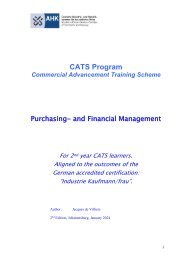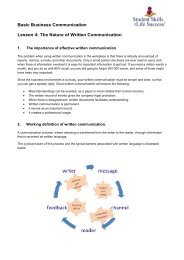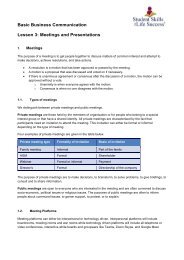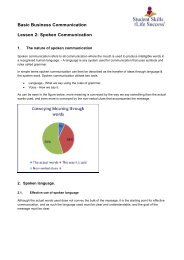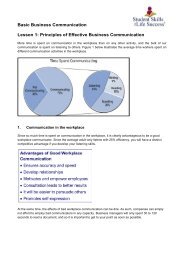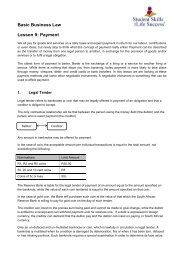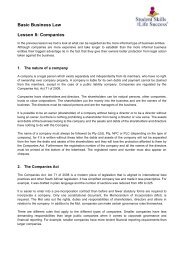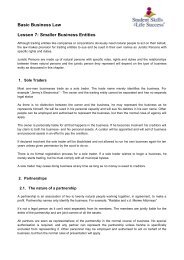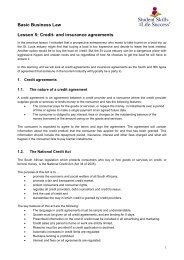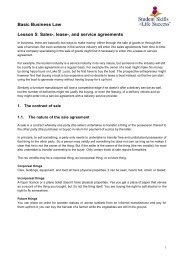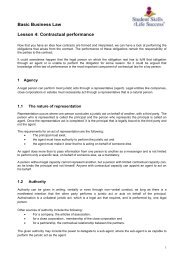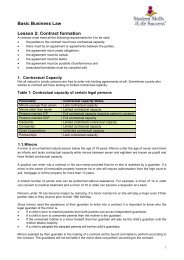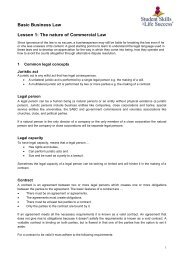Basic Business Law. Lesson 3. Contract Interpretation
This is the third lesson of the "Student Skills for Life Success" "Basic Business Law" course. The topics covered in this booklet are: 1. The contents of the contract 2. Voidable contract 3. Available remedies
This is the third lesson of the "Student Skills for Life Success" "Basic Business Law" course. The topics covered in this booklet are:
1. The contents of the contract
2. Voidable contract
3. Available remedies
Create successful ePaper yourself
Turn your PDF publications into a flip-book with our unique Google optimized e-Paper software.
1.1.2 Tickets<br />
Typically a supplier of goods or services will issue the customer with a document<br />
setting out certain provisions which the supplier wishes to incorporate in the contract. – Often an exemption<br />
clause. One way of introducing these terms is thru the issuing of a ticket.<br />
The law holds that, even if the customer was unaware that there was writing on the ticket he will be bound by<br />
the contract incorporating the terms in question, provided the supplier did what was reasonably necessary to<br />
bring the terms to his attention.<br />
The following provisions apply:<br />
• The ticket must be handed over before the agreement is concluded.<br />
• The ticket must be a document in which a reasonable person would expect to find terms. For example,<br />
terms would be expected as part of a quotation, but not as part of an invoice, or an account statement.<br />
• The writing must be prominent//clear.<br />
• The customer must be given an opportunity to examine the ticket.<br />
1.1.3 Notices<br />
Instead of issuing a ticket, a supplier can exhibit, at the place where the contract with the customer is<br />
concluded, a notice setting out one or more provisions which he wishes to include in the contract.<br />
The law holds that even if the customer did not see the notice or, if he did not read it, he will be bound by the<br />
provisions in question, provided the supplier did what was reasonably required to bring them to the notice of<br />
the customer.<br />
As in the case of tickets, some provisions apply:<br />
• Notification must be contemporaneous (at the same time) with contract formation<br />
• The notice must be conspicuous (on show)<br />
• The writing must be prominent<br />
• The provisions must be noticeable<br />
• The customer must be given an opportunity to read the notice<br />
Nothing prohibits a supplier from both displaying a notice and issuing a ticket containing terms.<br />
1.2 Implied terms<br />
1.2.1 Tacit terms<br />
These are terms that exist to give effect to the parties' common intention. A court will not lightly intervene to<br />
remedy a deficiency in a contract, but if the suggested term is necessary to give effect to the common<br />
intention of the parties it will be read into the contract, even if the parties did not actually think of the term or a<br />
situation in which it would come into operation.<br />
The court usually applies the curious bystander test to determine the intention of the parties. This test poses<br />
the question: what would the parties have said if, at the time of contracting, a bystander had asked; 'what will<br />
happen in such a case'?<br />
The test requires that, when asked about it, they should immediately and unanimously agree on the term to<br />
govern it.<br />
The court cannot imply a term in the following cases:<br />
2




